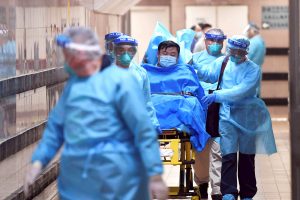“An Oncology Unit Nurse Asks…” is a repeat of an earlier Dr. Neimeyer column that we think is especially appropriate for Labor Day. We all need to understand the emotional toll the pandemic is taking on health care workers.
-Editor
Dear Dr. Neimeyer,
I work on an oncology unit in a large metropolitan hospital as a senior nurse, supervising several RNs and nursing assistants who care for many seriously ill patients. Although most of the care we provide supports their recovery, we also lose many patients each week, some of whom are offered palliative care services on the unit. Even though the typical stay is brief, readmissions are common, and we get to know many patients and their families well across a period of months and years. This makes it hard when patients die, as many inevitably do, and I fear that many of my staff are experiencing an accumulation of grief, stress and burnout, which seems to be contributing to several staff members missing work or leaving for other units with less mortality risk or quitting the profession altogether. I have to confess that I myself have sometimes felt a wave of emotion and had to suppress tears when I learned of the death of some patients I have grown fond of, or when I encountered the weeping family afterward—especially when they included children.
makes it hard when patients die, as many inevitably do, and I fear that many of my staff are experiencing an accumulation of grief, stress and burnout, which seems to be contributing to several staff members missing work or leaving for other units with less mortality risk or quitting the profession altogether. I have to confess that I myself have sometimes felt a wave of emotion and had to suppress tears when I learned of the death of some patients I have grown fond of, or when I encountered the weeping family afterward—especially when they included children.
My question is, is this normal? And is there anything we can do about it, aside from just try to deal with it and move on? The hospital is a demanding environment, and I understand the limits of time for self-care, but I sense that there must be a better way to deal with patient loss than we have at present.
Jamie T., MSN
Dear Jamie
First, I have to say that I applaud your candor, as well as your sensitivity to the impact of patient death on the nurses serving under and around you. The stress associated with multiple patient losses is a common issue in oncology and other healthcare settings with high risk of mortality, but the pace and demands of the hospital typically leave no time and no venue for self-care, and even less for mutual support in the face of this major contributor to burnout and compassion fatigue, as well as absenteeism. Symptoms of burnout can be physical (feeling tired and drained at work), cognitive (being too exhausted to think clearly or finding it hard to concentrate) or emotional (being unable to be sensitive or responsive to the psychological needs of patients and their families). Nearly half of all oncology nurses have been found to report burnout in these terms.
What can be done about this common and serious problem? Some factors that we have found in our research to protect against burnout in palliative and bereavement care are personal, such as more frequent daily spiritual experiences (feeling connected to the divine or being thankful for one’s blessings), whereas others are both personal and institutional (such as the amount of training one has had in psychosocial dimensions of end-of-life and bereavement care). Interestingly, whereas both spirituality and training seem to buffer against physical and cognitive burnout, only spiritual experiences appear to protect professionals from its emotional aspects.
But as important as these background factors are, the question remains of what can be done on the unit to mitigate the grief-rated distress of staff. Here, it is encouraging that some practices are gaining wider implementation in a great range of hospital settings, especially in the US and UK. One such is the Schwarz  Round, a multidisciplinary gathering of physicians, nurses, psychologists and allied health professionals involved in patient care in critical settings, especially those characterized by frequent patient death. In a minimally structured environment, professionals meet on a “level playing field” to discuss their ethical dilemmas, questions and feelings regarding the treatment of patients with serious illness or injury, especially in the wake of their death. Although learning certainly occurs in the open discussion than ensues, the central goal is expression of personal reactions to the work that otherwise have no institutional outlet, in the presence of mutual support and compassion on the part of professional peers.
Round, a multidisciplinary gathering of physicians, nurses, psychologists and allied health professionals involved in patient care in critical settings, especially those characterized by frequent patient death. In a minimally structured environment, professionals meet on a “level playing field” to discuss their ethical dilemmas, questions and feelings regarding the treatment of patients with serious illness or injury, especially in the wake of their death. Although learning certainly occurs in the open discussion than ensues, the central goal is expression of personal reactions to the work that otherwise have no institutional outlet, in the presence of mutual support and compassion on the part of professional peers.
A second creative response to the cumulative grief of professional caregivers in general and nurses in particular was formulated by Popkin and her associates, who designed a music-therapy centered grief intervention for staff working in cancer settings much like your own. Stemming from the collaboration of expressive arts, clinical and pastoral care professionals, the intervention took the form of a weekly ritual in which 10 or more members of the patient care team would convene in a circle in the unit conference room, as senior nurses arranged for their coverage for the 45 minutes assigned to the activity. The time was divided into the following segments, as described more fully in their report of the work in the journal Music and Medicine:
1. Improvised music on harp and guitar by two music therapists, establishing a reflective, contemplative tone (5 minutes)
2. Welcome, explanation of the aims of the ceremony, and brief introduction of participants by name and role (3 minutes)
3. Reading of an inspirational piece that acknowledges loss but also gain (2 minutes)
4. Reminiscence on the part of participants about patients who have died recently under their care, perhaps using a structure like, “I would like to remember…. She was important to me because….” These can be sad, humorous or uplifting, as the speaker prefers (25 minutes in total).
5. Second reading of a piece that suggests hope or rededication to caregiving (5 minutes)
6. “Blessing of the Hands” ceremony that validates the work and healing of each participant’s hands, as a member of the chaplaincy pours scented water over them in a basin, and dries each with a fresh towel, while they invoke a nondenominational blessing, softly spoken: “May your hands be blessed in what they hold and what they let go. May the work of your hands be blessed in gentleness and strength. May your work be blessed with care and love. Thank you so much for all the work and care you give.” Accompanied by improvised music on harp and guitar (5 minutes)
As implied but the inclusion of the music, readings and blessing, the ritual has a spiritual aspect, though this does not invoke any deity or any particular faith or tradition. The ceremony requires careful time management, as most staff must return immediately to work afterwards, and the time-limited structure supports this goal. Impressively, preliminary research on staff reactions to the ritual suggests that it is highly effective, especially in the reminiscence and blessing components, in giving staff an opportunity to honor their losses, express their grief, and feel validated in their role as care providers. While Schwartz Rounds and Popkin’s work represent merely two of a potentially large range of creative responses, they illustrate how multidisciplinary collaboration in the construction of practices and rituals could go a long way toward reducing the risk of burnout in critical care settings.
—Dr. Neimeyer
CLICK HERE TO JOIN AFTERTALK
Free, Non-Profit and Non-denominational
Every Wednesday we will be publishing Pandemic Weekly for, we hope, not too long. We invite you to submit your thoughts, essays, poems or songs. Please send to info@aftertalk.com. To see past Pandemic Weeklies, CLICK HERE


Dear Dr. Neimeyer;
It was a very good question from Jamie and a very good answer you gave her (and us). Although my work is related to grief after someone had died, l think your suggestion can also be applied to volunteers (facilitators of Bereavement Support Groups). We do debriefing after each session; however this is a creative response for volunteers to feel like you said validated in their roll as care givers. Gracias